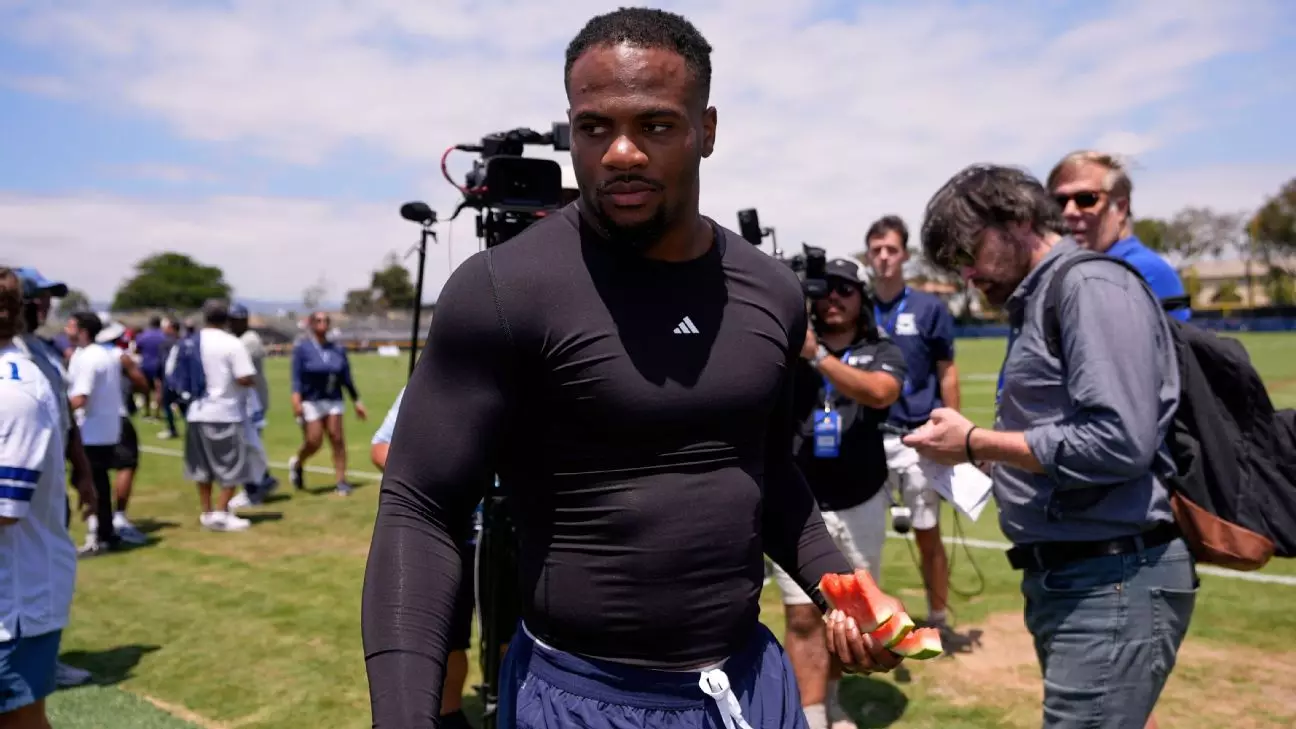The Dallas Cowboys find themselves at a critical crossroads, not just on the field but off it as well. Despite a roster filled with talent and dream-filled aspirations, one fundamental issue remains unresolved: the contract extension for Micah Parsons. This lingering uncertainty casts a shadow over the team’s future, revealing a deeper malaise within franchise management that threatens to undermine its longstanding aspirations for excellence. The reluctance—or perhaps inability—to broker a deal with their star linebacker reflects a shortsightedness that could have lasting repercussions well beyond this season.
The assumption that Parsons will be ready for the season opener despite the absence of recent practice raises troubling questions. Are the Cowboys truly prioritizing long-term stability, or are they dangerously assuming talent can compensate for contractual and health concerns? This mindset is perilous, especially with the NFL’s unforgiving physical demands. The failure to finalize Parsons’s deal signals more than a negotiation standoff; it reveals a lack of strategic foresight that could backfire, exhausting vital resources and morale.
Short-Term Planning or Grave Negligence?
While coach Brian Schottenheimer expresses confidence in Parsons’s readiness, this optimism borders on wishful thinking. The player’s absence from full-contact practices, coupled with only walkthrough participation, underscores a fragile situation. The team’s overreliance on Parsons’s reputation and past performance neglects the importance of prepared, versatile backups. Rushing to include him in high-stakes games without comprehensive practice not only jeopardizes his health but also endangers the team’s defensive integrity.
There’s an inherent danger in prioritizing immediate availability over sustainable health. Parsons’s injury history, notably his back tightness, adds weight to these concerns. By sidestepping the necessity for on-field repetitions, the Cowboys risk exposing their star to injury at the most crucial moments. It’s a reckless gamble—trusting talent alone rather than thorough preparation—that could result in costly mistakes both in game outcomes and franchise stability.
Ownership’s Short-Lived Confidence and Its Flaws
Jerry Jones’s assertion that a deal was close back in March now rings hollow amid the current deadlock. This overconfidence reflects a common misconception—that negotiations can be expedited or that talent will always be sufficient without contractual clarity. Such complacency can create ripple effects far beyond one player’s deal. It breeds uncertainty, influences locker room morale, and complicates roster decisions. The looming 53-man cut underscores how mismanagement in contract negotiations can precipitate chaos on a team’s core structure.
The failure to engage in ongoing dialogue demonstrates a shortsighted focus on immediate needs rather than investing in the long-term health of the team. Jones’s past successes should not breed complacency, especially when such complacency fosters instability. It’s a profound error to assume that talent can be switched on at will or that a star player will seamlessly contribute despite unresolved negotiations. The sport demands holistic planning, and this oversight exposes a significant vulnerability.
Neglecting Player Welfare and Future Security
In a sport as brutal as football, player health is a currency—one that must be safeguarded with genuine commitment. Parsons’s situation exposes the Cowboys’s reactive approach to injury management, emphasizing recovery over prevention. The decision to limit him to walkthroughs and meetings while avoiding contact practice betrays a troubling focus: that the player’s value is purely in his present performance, not his future well-being.
Moreover, the team’s apparent assumption that Parsons’s talent will compensate for lack of on-field preparation is dangerous. Without the physical reps, his ability to perform under the immense pressures of an NFL season diminishes. Soft-tissue injuries, especially with players who rely on change of direction and explosion, are precisely the sort of setbacks that could be exacerbated by lack of proper buildup. This negligence to prioritize holistic injury prevention undermines the very integrity of player health, risking a costly injury that could threaten Parsons’s career longevity.
The Broader Implications for Franchise Success
Ultimately, this situation exposes a broader pattern in the NFL—a flawed respect for contractual stability as a cornerstone of sustained success. The Cowboys’s failure to secure Parsons’s future team commitment signals a fragile foundation. The decision-making process, seemingly driven by short-term performance metrics rather than strategic planning, jeopardizes the team’s cohesiveness and competitive edge. The Cowboys must realize that star power, while vital, is not a substitute for disciplined management and forward-thinking.
As the franchise prepares for the upcoming season amidst chaos and uncertainty, it’s becoming evident that neglecting the subtleties of player relationships and contractual commitments could be their undoing. The ongoing negotiation standoff highlights how fragile teams truly are—dependent not just on talent but on trust, stability, and a commitment to holistic player welfare. Without addressing these core issues, the Cowboys risk repeating the cycle of fleeting success and lingering disappointment—an outcome every seasoned fan should dread.

